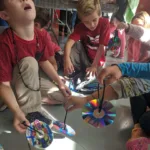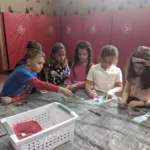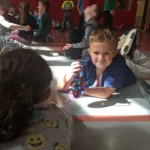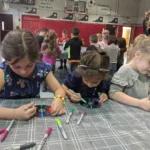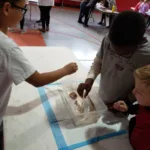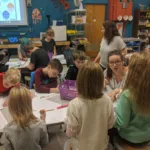Pentucket’s Bagnall Elementary School Hosts 2019 STEM Week Activities
GROVELAND — Principal Emily Puteri is pleased to announce that Bagnall Elementary School students are participating in a variety of science, technology, engineering and mathematics (STEM) workshops this week as part of a statewide initiative to promote learning in each field.
Bagnall Elementary School is participating in Massachusetts’ second annual STEM Week this week, an effort started by the Baker-Polito Administration to support students’ interest in STEM education.
“STEM Week is a wonderful opportunity to spark excitement and curiosity among our students about the incredible array of fascinating, challenging STEM fields out there,” Principal Puteri said. “Our students are excited about the opportunities they’ll have this week to learn about a range of topics, many of which have to do with sustainability and the environment.”
STEM Week activities at Bagnall Elementary School were organized by Brooke Welch, Pentucket Regional School District’s Science, Technology, Engineering, the Arts and Mathematics (STEAM) coordinator. The week’s activities are being funded by a STEM Week grant from the Merrimack College Northeast STEM Network, a group that helps connect educators and supports schools as they organize their annual STEM Week activities.
“Each activity we’ve planned for this week encourages our students to hypothesize about possible solutions, test their ideas, learn more about these topics, use their creativity and discuss possible solutions,” Welch said. “Students will also collaborate and will gain an understanding of how these topics — from the importance of reducing trash waste to removing microplastics from water — have a tremendous impact on the world they live in.”
Leading up to this week, kindergarten through second grade students at the school have been learning about food waste, composting, recycling and reducing their “foodprint.” Third through fifth grade students have been learning about novel energy solutions, unintended consequences and prototyping a way for the school to use a cleaner energy source. Sixth grade students have been studying the impact of microplastics on the environment, animals and the human body.
Over the course of this week, the school will host five workshops to support student learning and interest in various STEM topics. On Tuesday, students in kindergarten through second grade learned about trash and waste, upcycling and sustainability through an interactive “Children’s Museum” operated by educators in the small gymnasium at the school.
On Wednesday, third and fourth grade students took part in two workshops. In one program, students learned about the impacts of an oil spill and acted as environmental engineers to test different methods for effectively cleaning up an oil spill. In the second workshop, students visited the school’s makerspace and brainstorm how to make their school more sustainable and environmentally friendly.
Fifth and sixth grade students will also take part in two workshops on Thursday. In one workshop, students will learn about the amount of plastic that has been disposed of in the ocean, and will design and build a filter to remove pieces of plastic from an ocean model. They will also discuss possible solutions to reduce and remove plastic from the ocean. In the second workshop, students will gather in the school’s makerspace to create a procedure to remove plastic microbeads from a provided commercial personal care product, such as a facial cleanser or body wash.
The school’s STEM Week events will culminate in a school-wide presentation on revision energy on Friday by Elizabeth Rose, an advocate and Groveland resident who builds ecobrick structures in Guatemala for school children to show students alternative ways to build houses and structures from Plastic bottles and bags, known as ecobricks.
###
